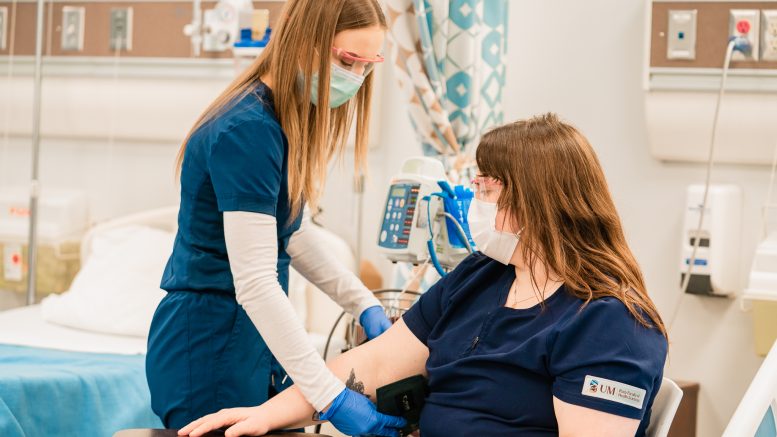This fall, the Rady faculty of health sciences’ college of nursing is celebrating the 25th anniversary of its partnership with the University College of the North (UCN) in northern Manitoba.
Since 1998, the two schools have worked together to provide U of M bachelor of nursing degrees to students in Thompson and The Pas, where both UCN campuses are located. The same curriculum is used at both universities.
Around the time the partnership started, the province began shutting diploma nursing programs as it consolidated nursing education, requiring a bachelor’s degree for nurses to begin practice.
UCN was founded in 2004, as it took over the role of Keewatin Community College and began to offer academic courses as well as skills and vocational training.
Although UCN has been able to confer its own degrees since then, dean of health at UCN Helga Bryant said the partnership with U of M continues because it benefits both institutions.
She said the UCN program gains additional credibility from its partnership with the “very long-standing, well-established college of nursing at U of M” and the academic approach they offer.
Bryant said that while the school’s mission is to “educate Northerners for the North,” it also often accepts students from Winnipeg.
“U of M typically has a waitlist,” she said, “we don’t always have a waitlist for our seats in the North.”
She said the U of M also values “having this program located at two campuses some 800 kilometres outside of Winnipeg.”
Applicants from U of M are given the choice to wait for a seat in the U of M program or relocate to the North. The UCN program accepts 20 students each in Thompson and The Pas per year. Over 540 nurses have passed through the program over the years.
As part of its 80-year anniversary on Sept. 24, the U of M college of nursing celebrated 25 years of the UCN partnership. The program also works with northern health-care agencies to provide clinical placements for graduates.
Dean of the college of nursing Netha Dyck explained that “clinical practice is a very important component” of the curriculum, comprising “more than 50 per cent” of the program’s hours.
“From an employer perspective, it’s also a great investment because they’ll be able to hire high-calibre graduates from our program,” Dyck said.
The province is facing a significant shortage of nurses, with northern communities, especially First Nations, being hit particularly hard. Staffing shortages led hospitals and emergency rooms in northern and rural communities to close a number of times in 2021 and 2022.
“In remote communities, it can often be one nurse calling in sick or not being able to get to work for some reason, and that person is the only nurse on, and then there is significant trouble because now you don’t have any nurses for the patients,” Bryant said.
The Northern Health Region scores worse than the rest of the province on a number of health metrics, including higher infant mortality rates, higher rates of death from injury and nearly double the rates of heart attacks and diabetes.
Josh Goldstein, a paramedic in The Pas and third-year nursing student in the U of M program at UCN, hopes to work in diabetes management when he finishes his degree.
In his time as a paramedic, Goldstein has seen how the health-care system in the North struggles with a lack of resources.
He said many in health care have been “drained” since the pandemic, with some nurses quitting altogether.
“The resources have been depleted, specifically since the pandemic and even a little bit before too, in the North,” he said.
Bryant said vacancy rates across Manitoba are so high that the numbers the program is “funded for and can graduate at this point are not adequate to meet that need.”
“But we do what we can with the resources we’re given and with the funding levels we have from government,” she said.
A 2018-19 UCN graduate satisfaction report found 68 per cent of employed graduates in the faculty of health have jobs in the North.
Goldstein said he would likely not remain in the North after his degree is complete, but that his time up north has “only benefited” him.
“I’ve seen a lot of self-growth because of working in the North compared to if I were to just stay in the city for the last seven years,” he said.
“It’s something I would recommend for anyone just to give a shot. You learn a lot about yourself. You can see firsthand the impact you have on the community.”


